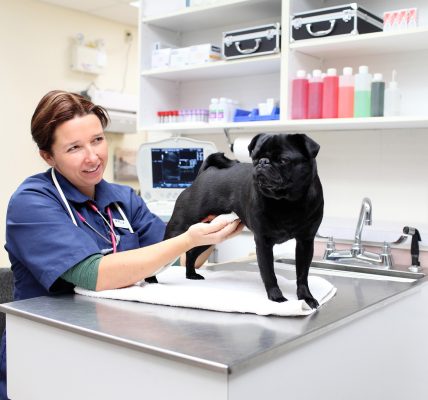In a typical animal hospital, triage will prioritize pets with life-threatening conditions over other sick animals. The medical staff will check a pet’s temperature using a rectal thermometer, listen to the lungs with a stethoscope, and feel for femoral pulses.
Owners should bring all of their pet’s medical records and current medications in labeled prescription bottles. A recent study found that giving patients at risk of delirium a mechanical robotic stuffed cat decreased the likelihood that they would develop agitation during their in-patient stay.
Emergency Care
In the event that your pet requires immediate attention when your family veterinarian’s office is closed, our animal hospital offers veterinary emergency care. The emergency service is staffed 24 hours a day, 365 days a year to treat pets who have serious or life-threatening conditions that cannot wait until their regular veterinarian’s office opens. Emergency services are supervised by a team of board-certified faculty specialists in emergency medicine and supported by residents, interns, and veterinary students who exclusively work in the emergency room.
When you arrive, our triage receptionists will assess your pet’s condition and determine their medical priority. You are encouraged to describe your pet’s symptoms to the triage staff, and they will take notes as they discuss your concerns with you. In some cases, your pet may be transferred within the hospital to an emergency veterinarian or to your local veterinary practice for continued care. Upon discharge, your family veterinarian is notified of the emergency and provided with a copy of your pet’s case record.
Isolation Ward
An isolation ward is an essential component of any animal hospital in Charlotte NC. Isolating infectious patients helps to prevent the transmission of pathogens to healthy animals and veterinary staff. Ideally, the ward should be physically separated from the rest of the hospital and fully self-contained.
The ward should have an area for administration of medications as well as examination areas and weight scales. It should also have a sink with suitable supplies for handwashing and alcohol-based hand rub, which should be readily available. It is important that visitors are able to wash their hands before and after entering the ward.
It is vital that staff who enter the ward have clear protocols regarding the handling of animals and the preparation and cleaning of the stall and anterooms. Special disinfectants that are virucidal and bactericidal should be used to clean all items in the stall and the anteroom. Any organic waste should be removed as some disinfectants are ineffective against it.
Pre-Admission Testing
In some cases the vet will decide that your pet needs pre-admission testing before a scheduled medical or surgical procedure. This may include blood tests, urinalysis, or X-rays. These tests help us evaluate your pet’s overall health in preparation for the upcoming surgery or medical procedure.
In these situations our veterinary team will work with you to come up with viable treatment options aimed at stabilizing your pet. This might involve a doctor-to-doctor consultation with one of our specialists, residents or interns.
If your pet is going to undergo a general anaesthetic we will usually give it a pre-medication prior to the operation. This will reduce the dose of anaesthetic that is required & helps your pet to relax more quickly.
Some pets, eg, some breeds of dogs, are at higher risk of anaesthetic complications due to their body conformation. For these animals we might give them a fluid drip (IV) during surgery to flush their kidneys & help to maintain a stable blood pressure.
Post-Admission Care
As your pet is being monitored in the hospital the veterinarian may need to discuss additional tests or x-rays with you. These can take some time to run and can be more complex than the initial testing that was done. The veterinarian will also talk with you about a treatment plan and cost estimate.
Many clients have questions and concerns during this period. The doctors are evaluating a large number of patients and cannot respond to every phone call. However, a client can ask for a doctor to return their call and the doctor will try to do so at his/her earliest convenience.
In the event of an emergency you will be contacted by senior students and/or residents who will ask you a series of questions regarding your pet’s history, housing, diet, symptoms and conduct a physical examination. These students have the same training as a regular veterinarian and can provide you with a similar level of care.

